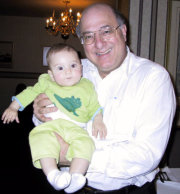And then, as also sometimes happens, current events provided the frame for my story. So, let’s begin with The Grape:
When I was about five years old, my mom brought me and my sister on a routine trip to the local supermarket. As we entered the produce aisle we found to our delight that grapes were in season again. Immediately my mom plucked a grape from a bunch on the shelf and popped it in her mouth. She gave one to my sister, who did the same. She gave one to me and I stared at it, aghast. “I can’t eat this,” I told her. “We didn’t pay for it!” My mom patiently explained that it’s OK if people take one or two grapes as they walk by. “But that’s stealing!” I protested. “If everyone did that, there’d be none left!” Other shoppers turned to see the little boy making accusatory sounds at his mom. “We’re going to buy some anyway,” my mom said, still holding out a grape to me, “so it’s OK if you have one.” No, I insisted — we had to wait until they were paid for. Losing her patience, my mom uttered through gritted teeth the punchline of one of my family’s most-retold stories about me: “Eat. The. Grape.” I flatly refused, and she pointedly fed more grapes to my sister. We went home sore at each other, and for the rest of her life, I would express dismay at her occasional willingness to commit (very) petty larceny, such as taking home a hotel towel or an interesting salt shaker from a restaurant; and she would come back with, “Eat the grape,” which became her shorthand for my irksome excess of honesty.
A few decades later, on a visit to Tucson for a wedding, I decided to find an airplane rental club and spend a morning exploring the local airspace. I tried to persuade my friend Bruce, also visiting Tucson, to come along for the ride, since he’d expressed an interest in learning to fly and had tried it once or twice. In the conversation that ensued, he told me his interest had flagged: “I just want to fly. I got bored with all the rules and procedures you have to follow.” “Are you kidding?” I returned. “That’s the best part!”
The words sounded strange coming out of my mouth — what a bizarre thing to admit enjoying — but it was true, I enjoyed the arcane radio protocol, I enjoyed filling out navigation logs and filing flight plans, I enjoyed checklists and weight-and-balance computations…
In fact, I enjoyed flying (it occurred to me) for the same reasons that I enjoyed road rallies. In Pittsburgh in the late 80’s and early 90’s, my friend Steve and I participated in several amateur road rallies of the “time-speed-distance” variety, where the goal is not to run the course in the shortest possible time but to follow the route — mostly picturesque rural roads — as accurately as possible, armed with a sometimes deliberately misleading set of “route instructions” devised by a more or less devious rallymaster, and a complex set of regulations for how to understand them. (To this day, one of the top Google hits for “road rally” is a document that I helped to write long ago.) The pretty scenery, for me, was secondary to the intellectual exercise of driving in a rally — just as I considered the rules and procedures to be “the best part” about flying. (True to his nature, the one time Bruce tried a road rally, he grew impatient with the route instructions, tossed them into the backseat, and struck off at random into the rolling hills of Western Pennsylvania — with the enthusiastic support of his equally bored rally partner, Andrea. “And today that woman is my wife.”)
Rules — I love ’em. I love the way simple ones gives rise to complex behavior, whether it’s a game of Go or the orderly society that emerges from (for instance) people paying for their produce before eating it. It’s no wonder I was drawn to a life of writing computer software, where rules per se achieve their purest realization. A computer program is nothing but rules, after all, and with some care and some artistry it can be made elegant and simple and still create a very rich set of behaviors.
Obviously not everyone is as enamored of rules as I am. So what’s the attraction? It must have something to do with a need to impose order on a bewildering and uncertain world — bewilderment and uncertainty that comes from the irrational behavior of other people. This is a common bit of pop psychology. Being unable to fathom irrational behavior, and withdrawing from even trying, explains, for example, the popularity of Star Trek‘s Mr. Spock (who, interestingly, is a hero especially among computer programmers).
My son Jonah seems to be like this. He is always keenly aware of the rules in any situation, and alert to anyone not following them, or to any other source of unfairness, and quick to call it out. Most of his friends are not so preoccupied about fairness, but he does have one or two who are paralyzed by fits of red-faced outrage whenever anything doesn’t go according to the rules.
Having witnessed a couple of those fits, and thinking back over my own life, I’ve lately come to think that those who love rules are at a disadvantage to those who can abide their neglect, who can tolerate ambiguity better. Mr. Spock was only the first officer aboard the Enterprise, after all; it took the greater resiliency of James T. Kirk to be the captain. And while one of Jonah’s friends is pitching a fit, the others are still running around and having a great time, completely unfazed.
This is what brings us around to current events. This week the U.S. Senate will debate the so-called FISA bill that, among other things, gives retroactive legal immunity to the Bush administration and to various large corporations for illegal warrantless wiretapping activities dating back to before 9/11, and prohibits any details of those illegal activities from ever coming to light. You could have been the subject of illegal surveillance, and if this bill passes, as it is expected to do, you would have no legal recourse for finding out about it, ever. Does this sound fair? Of course not, and those who love playing by the rules have been up in arms about it — red in the face and all but paralyzed, like one of Jonah’s fit-pitching friends. As DailyKos’ Hunter writes:
So, why have activists spent so much effort opposing retroactive corporate immunity as part of new FISA legislation, when there are so many other things in the world to be outraged about? […] It demonstrates a complete lack of regard for the law
and
We were never told why it was so all-fired important […] the only rationale available seems to be the most cynical one — it is merely doing the bidding of companies that provide substantive campaign contributions.
So we citizens can believe all we like that everyone’s equal before the law, but in fact if you’ve got pockets deep enough, you can buy whatever kind of law best suits you. Very likely this has always been the reality in America (as it has throughout human history), but all past attempts to tilt the playing field in favor of the powerful and the well-connected at least pretended to be for the common good. This bill does not, and that’s what’s so jaw-droppingly wrong with it: it says that the vaunted “rule of law,” the very bedrock of the Enlightenment and the principle that has always guided America no matter how far she’s strayed from it, is now officially just a fairy tale, and only fools will henceforth strive toward that ideal. If you’re wealthy, go ahead and break whatever laws you like; your pals in Congress will patch things up later.
How many generations will it take for America to recover from abandoning even the pretense of fairness? How much civil unrest? How much political violence?
This is another reason people like me love rules — we can see what life would be without them. But if the rule of law is just a fantasy and always has been, then laying it bare like this might be just the thing we need. Give everyone else a chance to see what life is like without rules. In the end, I predict, though the cost may be high, everyone will love them like I do.

